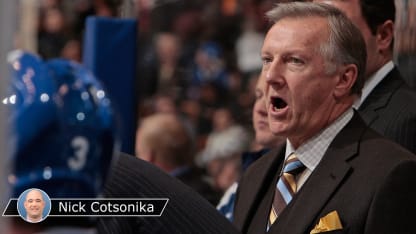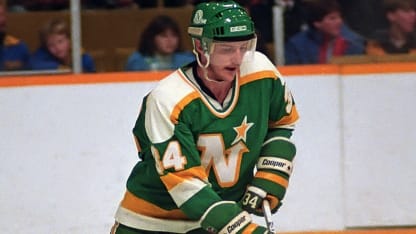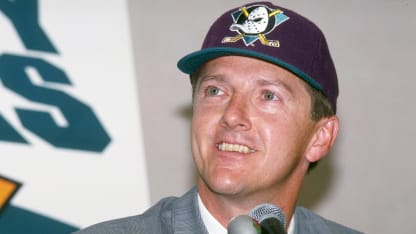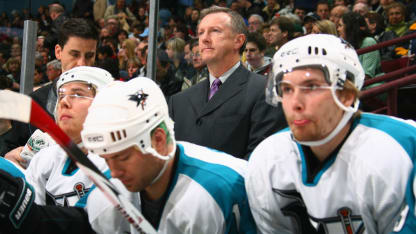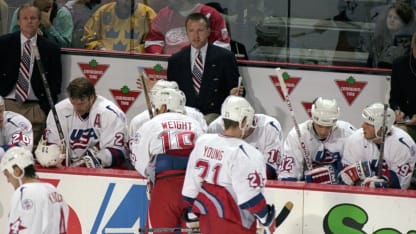But that was just part of a career that merits his induction as an individual in Boston on Wednesday, with Kevin Collins, Jack Parker, Ben Smith and Scott Young.
Wilson was ahead of his time, thinking offensively as a player, using technology as a coach. He had 250 points (78 goals, 172 assists) in 111 games at Providence College from 1973-77, still the NCAA record for points by a defenseman. He won 648 games as an NHL coach, 10th in history, most among Americans, and led the Washington Capitals to the 1998 Stanley Cup Final. He also coached the United States to silver medal at the 2010 Vancouver Olympics and the bronze medal at the 2016 IIHF World Junior Championship.
"This is overdue, in my mind," said Calgary Flames president of hockey operations Brian Burke, Wilson's co-captain at Providence and longtime colleague. "When you say Ronnie Wilson's going into the U.S. Hockey Hall of Fame, you're like, 'Really? In 2017? Really?'"
Wilson, 62, had a stroke Dec. 6, 2016 and struggles with balance. It hurts that he can't play golf anymore at home in Hilton Head, South Carolina. But he still has his swagger, wit and sense of humor, and will travel for his induction.
Again.
"He's already in," said Toronto Maple Leafs general manager Lou Lamoriello, Wilson's coach at Providence and longtime colleague, a teasing tone in his voice. "So this is a double dip."
* * * * *
Wilson was born in Windsor, Ontario, and raised in Fort Erie, Ontario, the son of Larry Wilson and nephew of Johnny Wilson, each of whom played and coached in the NHL. But he moved to Riverside, Rhode Island, when he was 12 and became a U.S. citizen at 18.
Lamoriello recruited Wilson to Providence, where Wilson emulated a defenseman nearby.
"I was trying to be the Bobby Orr of college hockey," Wilson said. "Which obviously I was."
That's not cocky. That's the truth.
"He's still the best college defenseman ever," Burke said. "He dominated college hockey."
Wilson had 38 points (16 goals, 22 assists) in 26 games as a freshman and 87 points (26 goals, 61 assists) in 27 games as a sophomore.
"And he probably could have had more points if his coach, and you're talking to him, would have maybe let him play more in certain games," Lamoriello said, laughing.
Lamoriello preached discipline and defense, as he would later as the GM of the New Jersey Devils. But Wilson was special.
"I kind of think I was the first player he ever had where he didn't bother with me at all," Wilson said. "He just let me be me, and that was really important to my development as a player."
And, eventually, to his development as a coach.
After his sophomore season, Wilson represented the United States at the 1975 IIHF World Championship. He played for coach Bob Johnson and learned different styles and training methods.
"That was really the turning point in my career," Wilson said. "Everything changed for me."
Wilson had 66 points (19 goals, 47 assists) in 28 games as a junior and 59 points (17 goals, 42 assists) in 30 games as a senior. He called his four years at Providence the best of his life.
"He was the best college player that I ever had the opportunity to coach," Lamoriello said. "He could do just about anything he wanted. His hockey sense was elite, his passing skills were elite and his style was perfect for the game today. If he were at the age he was at when he was drafted and signed after college, he would be a star in the [NHL] today."
Wilson was not a star in the NHL, but that also helped shape him as a coach.
The Toronto Maple Leafs took Wilson in the eighth round (No. 132) in the 1975 NHL Draft. His first game, against the Vancouver Canucks at Maple Leaf Gardens on March 4, 1978, he was on the power play with Lanny McDonald, Borje Salming, Darryl Sittler and Tiger Williams and he had a goal and an assist. But he played 64 games for the Maple Leafs in three seasons, and had 22 points (seven goals, 15 assists).
"I felt like I never really got the chance to play the game that I wanted," Wilson said. "That's why I ended up going to Europe."
Wilson spent eight seasons in Switzerland, plus four with the Minnesota North Stars, hopping back and forth at times. He had 430 points (186 goals, 244 assists) in 249 games in Switzerland and 71 points (19 goals, 52 assists) in 113 games for the North Stars. He also represented the United States at the world championship in 1981 and 1987.
